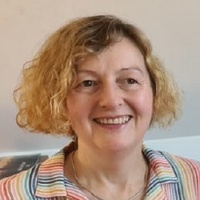
BA (University of Cambridge, 1989), PhD (MRC Laboratory of Molecular Biology, Cambridge, 1994)
Personal Chair
- About
-
- Email Address
- a.d.donaldson@abdn.ac.uk
- Telephone Number
- +44 (0)1224 437316
- Office Address
Room 2:17 Institute of Medical Sciences Foresterhill University of Aberdeen Aberdeen AB25 2ZD Lab phone +44 (0)1224 437312
- School/Department
- School of Medicine, Medical Sciences and Nutrition
Biography
Anne Donaldson investigates how cells replicate their DNA, a central biological process that is essential for cell multiplication. Her research group is funded by major grants from Cancer Research UK and the Wellcome Trust. Within the Institute of Medical Sciences Anne leads the 'Chromosome & Cellular Dynamics' Section, consisting of six research groups who share interests in chromosome dynamics. Anne teaches on topics related to chromosome maintenance on several undergraduate and graduate-level courses.
After her Bachelors degree in Natural Sciences at the University of Cambridge, Anne completed her PhD at the MRC Laboratory of Molecular Biology, then moved as a NATO/SERC postdoctoral fellow to the University of Washington in Seattle. Anne established her lab as a Royal Society University Research Fellow at the University of Dundee, and in 2001 Anne was chosen as an EMBO Young Investigator. The Donaldson laboratory has been at the University of Aberdeen Institute of Medical Sciences since 2003.
Anne served as Organizer of the Cold Spring Harbor Eukaryotic DNA Replication & Genome Maintenance meeting from 2014-2019.
- Research
-
Research Overview
!!We have Postdoc and PhD positions available in the lab, funded by the Wellcome Trust and by Cancer Research UK!!
Interested applicants please send CV to Anne Donaldson with an explanation of your interest in our research area and your related lab experience.
Human cells contain 1.8 metres of DNA in a nucleus only about 6 microns in diameter. During chromosome replication this entire length of DNA must be duplicated exactly once with perfect accuracy, so that the strands can be disentangled and precisely segregated to the daughter cells. The DNA is extremely vulnerable to damage during this process, and cells must deal with thousands of potentially lethal DNA damage events every single day. Members of the Donaldson lab investigate the molecular controls over DNA replication and damage repair. Understanding chromosome maintenance will suggest new therapeutic strategies in the fight against cancer, as well as illuminating the basic mechanisms at the heart of the cell division cycle.
The budding yeast S. cerevisiae provides an excellent model organism for studying the fundamentals of chromosome biology, because of the remarkable molecular genetics tools available for this system. DNA replication initiates at multiple sites on each chromosome called replication origins. We use molecular genetics to understand the processes of yeast DNA replication, which we then investigate in human cells. Using this approach we have discovered several molecular mechanisms of replication control that operate throughout eukaryotic cells.
Our focus of interest is understanding the molecular machinery controlling origin initiation, replication fork progression, and chromosome maintenance. We use a combination of advanced proteomic, biochemical, genomic and microscopy methods to investigate the cellular components that regulate these DNA replication and repair processes.
Funding and Grants
Cancer Research UK Programme Award (£1,561,000) ‘How does Rif1 regulate DNA replication and cell recovery after chemotherapeutic replication inhibition?' Grant to Prof Anne Donaldson & Dr Shin-ichiro Hiraga
Wellcome Trust Discovery Award (£2,475,614) ‘Control of DNA Replication by Protein Dephosphorylation: the Role of Protein Phosphatase 1 and its Regulatory Interactors’
- Publications
-
Page 4 of 4 Results 31 to 39 of 39
OriDB: a DNA replication origin database
Nucleic Acids Research, vol. 35, no. Database Issue, pp. D40-D46Contributions to Journals: ArticlesGenome-wide identification of replication origins in yeast by comparative genomics
Genes & Development, vol. 20, no. 14, pp. 1874-1879Contributions to Journals: Articles- [ONLINE] DOI: https://doi.org/10.1101/gad.385306
The Ctf18 RFC-like complex positions yeast telomeres but does not specify their replication time
EMBO Journal, vol. 25, no. 7, pp. 1505-1514Contributions to Journals: Articles- [ONLINE] http://www.ncbi.nlm.nih.gov/pmc/articles/PMC1440320/
- [ONLINE] DOI: https://doi.org/10.1038/SJ.EMBOJ.7601038
- [OPEN ACCESS] http://aura.abdn.ac.uk/bitstream/2164/802/1/52667.pdf
The requirement of yeast replication origins for pre-replication complex proteins is modulated by transcription
Nucleic Acids Research, vol. 33, no. 8, pp. 2410-2420Contributions to Journals: Articles- [ONLINE] DOI: https://doi.org/10.1093/nar/gki539
Shaping time: chromatin structure and the DNA replication programme
Trends in Genetics, vol. 21, pp. 444-449Contributions to Journals: Literature Reviews- [ONLINE] DOI: https://doi.org/10.1016/j.tig.2005.05.012
DNA replication: telling time with microarrays
Genome Biology, vol. 4, no. 2Contributions to Journals: Articles- [ONLINE] DOI: https://doi.org/10.1186/gb-2003-4-2-204
Ku complex controls the replication time of DNA in telomere regions
Genes & Development, vol. 16, no. 19, pp. 2485-2490Contributions to Journals: Articles- [ONLINE] DOI: https://doi.org/10.1101/gad.231602
DNA replication: stable driving prevents fatal smashes
Current Biology, vol. 11, no. 23, pp. R979-82Contributions to Journals: Articles- [ONLINE] DOI: https://doi.org/10.1016/S0960-9822(01)00579-6
Eukaryotic DNA Replication: from ORC to fork
Genome Biology, vol. 2, pp. 4030.1-4030.3Contributions to Journals: Articles- [ONLINE] DOI: https://doi.org/10.1186/gb-2001-2-12-reports4030
